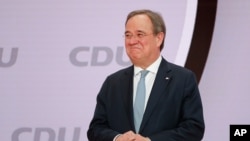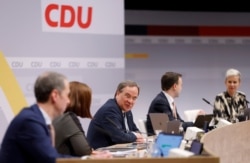Germany’s ruling Christian Democrats (CDU) Saturday chose Armin Laschet, premier of North Rhine-Westphalia, Germany's most populous state, as their new leader. The pick suggests the party favors continuing with German Chancellor Angela Merkel's middle-of-the-road policies when she steps down in September after 16 years in office.
Laschet’s win puts him in position to succeed Merkel when the CDU and its sister party, the Christian Social Union, decide in March who should become the center-right bloc’s candidate for chancellor in national elections.
The CDU has led Germany’s federal government for 52 of the past 72 years.
Laschet, 59, now replaces as chair of the party Annegret Kramp-Karrenbauer, the defense secretary whom Merkel had been grooming as her successor. Kramp-Karrenbauer largely failed to assert her authority over the party and announced her resignation in February after blaming Merkel for not being supportive enough.
A longtime Merkel loyalist — some see Laschet as the male version of her — he said during the campaign that a change of direction for the party would “send exactly the wrong signal,” as he touted himself as the continuity candidate in a contest that saw him pitched against corporate lawyer Friedrich Merz, a far more conservative figure and Merkel critic, and Norbert Röttgen, chairman of the Bundestag’s foreign affairs panel.
Röttgen, also a centrist, was eliminated in the first round of voting. The party’s 1,000 delegates, who voted in a virtual conference, then gave Laschet his win in a runoff that saw him beat Merz by 55 votes.
'Stick together'
“I want to do everything so that we can stick together through this year," he told his CDU colleagues after his win. " … And then make sure that the next chancellor in the federal elections will be from the [CDU/CSU] union.”
For months, Laschet, who's pro-immigrant, was Merkel's preferred candidate. He defended her during the 2015 refugee crisis. But their relations turned frosty earlier this year when he pressed for an early relaxation of COVID-19 restrictions, forcing him to scramble to repair the political damage he sustained inside and outside the CDU.
During his campaign he repeatedly stressed the importance of continuing with Merkel’s overall approach of expanding the CDU’s voter base, dismissing suggestions the party needs to be fearful of conservative voters defecting to the far-right Alternative for Germany, or AfD.
“We will only win if we remain strong in the center of society,” Laschet said Saturday, emphasizing the dangers of perpetuating political polarization.
Party leaders across the political spectrum joined Merkel in speedily offering congratulations.
So, too, did Laschet’s rivals, Merz and Röttgen.
“Now there is no competition within the CDU anymore but with others,” Röttgen said, adding that now is the time to “build a team with team spirit.” Merz thanked party members for “good cooperation over the past 10 months,” admitting he had not made life easy for Kramp-Karrenbauer.
“It's going to be an enormously trying time for all of us now over the next few weeks and months,” Merz said.
Some critics
Other German politicians were not so favorable. AfD's Jörg Meuthen said the result was “bad news for Germany” because Laschet’s selection would see a continuation of Merkel's centrist policies.
The co-leader of the left-wing Die Linke, Katja Kipping, said Laschet's victory didn't mean he would become the CDU's chancellor candidate, adding: “No matter who wins the race for the CDU candidate for chancellor, the CDU will not be ready to set the course to get us out of the crisis in a fair manner.”
Laschet’s speech Saturday in the run-up to voting attracted a positive response from many German commentators.
Thorsten Benner, director of the Global Public Policy Institute, an independent think tank in Berlin, tweeted:
Staunchly pro-EU, Laschet served as a European parliamentarian from 1999 until 2005 in Brussels, where he focused on foreign affairs. He has, however, disagreed with Merkel over the pace of European integration, and faulted the chancellor for not embracing French President Emmanuel Macron’s push for deeper and speedier political union.
“The French president is making proposals, but we are taking too long to respond,” he said last year.
Russia, China
The new CDU chair has also urged the West against demonizing Russian President Vladimir Putin and wants Germany to develop deeper economic ties with China. Last year, he criticized Washington and London for excluding Chinese telecommunications group Huawei from a role in developing Europe’s 5G wireless network.
“The consequences of exclusion would be a delay in deploying this technology,” he said. “That can’t be our goal. As an export-oriented country we have a large interest in free trade. German business lives from international exports, also those to China.”
An aide to U.S. President-elect Joe Biden said he predicted the incoming administration could clash with Laschet on Russia and China if he's elected chancellor.
“Laschet favors a less confrontational approach to Moscow and Beijing,” said the aide, who asked not to be identified.
But, the Biden aide noted, Laschet favors maintaining very close transatlantic relations.
“The U.S. is our most significant partner outside the European Union," Laschet said in 2019. "It is the world’s leading technology nation, and it is of critical importance to security in Europe.”
Laschet did, however, prompt anger in 2014 in Washington and was accused of trading in conspiracy theories when he criticized the Obama administration for its support of rebels in Syria, tweeting to then-U.S. Secretary of State John Kerry: “You supported ISIS and Al-Nusra against President Assad in Syria. And they are financed by Qatar and Saudi Arabia.”
Analysts are divided on whether the CDU can win the September election under Laschet’s leadership.
“While Laschet has convinced a majority of delegates at the party congress, it's questionable whether this message of pragmatism and continuity will be enough to win national elections,” tweeted Ulrich Speck, senior visiting fellow at the German Marshall Fund of the United States in Berlin. “And more important: whether it will be enough to make sure that Germany's success story continues.”
But Peter Neumann, a professor at King’s College, University of London, said Laschet is a gifted politician.
“Often underestimated, he's smarter, more skillful, and tenacious than people think,” he tweeted.












